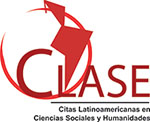Desarrollo de la habilidad de Writing a través de aplicaciones tecnológicas en clases virtuales de inglés como segunda lengua
DOI:
https://doi.org/10.23857/dc.v8i4.3024Palabras clave:
TecnologÃa, Writing, Padlet, Hemingway APP.Resumen
El uso de aplicaciones tecnológicas es sumamente necesario en la enseñanza de una segunda lengua, el hecho de que la escritura sea una de las habilidades mós complicadas para desarrollar por los estudiantes, hace imprescindible la necesidad de su implementación; en la presente investigación se tomó como objeto de estudio a los estudiantes de séptimo nivel, realizando dos grupos de investigación, a un paralelo de 40 estudiantes se implementaron las plataformas Padlet y Hemingway APP, para mejorar la habilidad de Writing en los estudiantes; Y a su vez se seleccionó otro paralelo de séptimo nivel, donde no se utilizaron aplicaciones tecnológicas para el desarrollo de esta habilidad, enseñóndose de la manera tradicional. El tipo de investigación seleccionada es proposicional, se realizaron tres mediciones de avances, antes de empezar el modulo (Pre-Test) al terminar el primer parcial y al finalizar el segundo parcial; se realizaron a su vez entrevistas, midiendo el nivel de aceptación de ambos paralelos. Los resultados obtenidos cumplieron con los objetivos de la presente investigación, dando como resultado una diferencia sustancial entre la aplicación de ambos métodos.
Citas
Ahmadi, D., & Reza, M. (2018). The use of technology in English language learning: A literature review. International Journal of Research in English Education, 3(2), 115-125. http://ijreeonline.com/article-1-120-en.html
Dewi, P. (2019). Teaching English for young learners through ICTs. Humanitatis: Journal of Language and Literature, 6(1), 11-24. DOI: https://doi.org/10.30812/humanitatis.v6i1.612
Emaliana, I. (2017). Teacher-centered or student-centered learning approach to promote learning?. Jurnal Sosial Humaniora (JSH), 10(2), 59-70. DOI: http://dx.doi.org/10.12962/j24433527.v10i2.2161
Fansury, A. H., Januarty, R., & Ali Wira Rahman, S. (2020). Digital Content for Millennial Generations: Teaching the English Foreign Language Learner on COVID-19 Pandemic. Journal of Southwest Jiaotong University, 55(3). Retrieved from http://jsju.org/index.php/journal/article/view/630
Grejda, G. F., & Hannafin, M.J. (1992). Effects of Word Processing on Sixth Graders’ Holistic Writing and Revisions. The Journal of Educational Research, 85 (3), 144-149.
Haerazi, H., Utama, I. M. P., & Hidayatullah, H. (2020). Mobile applications to improve English writing skills viewed from critical thinking ability for pre-service teachers. International Journal of Interactive Mobile Technologies (iJIM), 14(07), 58-72. Retrieved from https://onlinejour.journals.publicknowledgeproject.org/index.php/i-jim/article/view/11900
Hillocks, G., Jr. (1985). Research on Written Composition: New Directions for Teaching. Urbana, IL: National Conference on Research in English and ERIC.
Liesa-Oríºs, M., Latorre-Cosculluela, C., Vázquez-Toledo, S., & Sierra-Sánchez, V. (2020). The technological challenge facing higher education professors: Perceptions of ICT tools for developing 21st century skills. Sustainability, 12(13), 5339. DOI: https://doi.org/10.3390/su12135339
Northcott, B., Miliszewska, I., & Dakich, E. (2007). ICT for (I) nspiring (C) reative (T) hinking. ICT: Providing Choices for Learners and Learning, Ascilite Singapore Proceedings, 761-768.
https://www.ascilite.org/conferences/singapore07/procs/northcott.pdf
Reddy, S. L., & Bubonia, J. (2020). Technology in education: Learning opportunities for teachers and students. Journal of Family & Consumer Sciences, 112(1), 46-50. DOI: https://doi.org/10.14307/JFCS112.1.46
Villegas Zamora, D. A. (2019). La importancia de la estadística aplicada para la toma de decisiones en Marketing. Revista Investigación y Negocios, 12(20), 31-44. Retrieved from:http://www.scielo.org.bo/scielo.php?pid=S2521-27372019000200004&script=sci_arttext
Wang, X., Shen, L., & Lu, X. (2016). Journal between Peer Learners: An Innovative Project to Motivate EFL Writers, RELC Journal, 47(2), 1-8.
Publicado
Cómo citar
Número
Sección
Licencia
Authors retain copyright and guarantee the Journal the right to be the first publication of the work. These are covered by a Creative Commons (CC BY-NC-ND 4.0) license that allows others to share the work with an acknowledgment of the work authorship and the initial publication in this journal.






